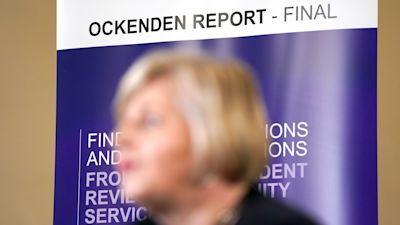'They will make your life hell': The bullying culture at heart of NHS's biggest maternity scandal

"They will make your life hell."
That's just one response from a worker at the Shrewsbury and Telford Hospital NHS Trust to a staff survey as part of the Ockenden report, when questioned about the culture at the Trust.
Some 65% of staff surveyed said they'd either witnessed or been the target of bullying in the workplace at the Trust.
'Staff Voices' was a questionnaire offered to former and current members of staff at the Trust, to highlight where they see scope for improvement but also to report on good practice in maternity services.
But before some staff had even started the survey, they said they'd already been discouraged from participating by their managers at the Trust.
And one big theme that emerged was a 'culture of bullying' and a fear among some staff to report and escalate incidents within maternity care.
Here are some of the comments and stories shared by staff:
Staff described a 'clique' on the labour ward at the Trust, with a culture of undermining and bullying. Some said this had negatively impacted their mental health, while others said they had difficulty finishing their shifts and secretly cried while at work.
"Some staff were told to be careful about how they answered this survey and were told to remember any comments made could be considered part of the police investigation. This is the kind of passive aggressive approach of threat that NHS organisations use to deter staff from speaking up. It is so historically ingrained in the culture and will have possibly put staff off participating in the survey."
Many told the review team of their fear of speaking out within maternity services, including those who are currently working in maternity at the Trust.
"It's very hard to speak up because despite what anybody will tell you, there are consequences to speaking up and the consequences are your life gets made very difficult. It's subtle - made to feel uncomfortable at work, not being invited on nights out, not being included in coffee mornings. It's very difficult to speak out, I've been there myself and ended up going off ill with it."
62% of staff surveyed reported they'd been concerned about patient safety.
"Nobody went out at any time wanting to harm anybody, it's just we didn't have the training and we didn't have the staff and that's how it was, unfortunately, and we don't know any different."
Staff commented on the low caesarean section rate - there was disagreement from others.
"They would definitely try to avoid a caesarean section - they were always trying to try for a normal birth all the time... they would just let things run purely because they didn't want the doctors to come in and sometimes you could see some of the shift leaders not wanting to call the registrar in or any of the doctors in..."
57% of staff surveyed said they'd raised professional or clinical concerns, with just over half of those saying there was a clear pathway for escalating those concerns.
"It is difficult to know where to take concerns when you have escalated through relatively senior channels and there is no improvement."
"I think we've been proportionate when we've raised concerns but most of the time people say yes, we understand, that's a valid concern, but there's no practical solution to it."
For a 'long time', executives and board members viewed the maternity service as performing well and as a result, did not apply a high level of scrutiny to the service.
"We got best performing and we got CNST Level 3, so these are independent organisations coming in and looking at it. Therefore, you should have some confidence in what these bodies are telling you."
What is 'Staff Voices'?
Staff Voices is an engagement strategy involving current and former staff at the Shrewsbury and Telford Hospital NHS Trust.
It was conducted from 12 May 2021 to 30 June 2021, with follow-up conversations taking place until January 2022.
The purpose of it was to help the review to understand the potential cause of any systematic problems - including the culture within the Trust and specifically maternity services and whether it has changed over time.
Senior midwife Donna Ockenden said that only 109 staff came forward to participate in the review, with 11 either later withdrawing or not responding to requests, meaning overall the staff voices of 98 current or former staff were used in the report - which she called 'disappointing'.
What will happen with the results now?
The feedback given in the Staff Voices survey has provided evidence and accounts to help form one of the local actions for learning - 'hearing the voices of staff'.
The Ockenden report concluded that the Trust must address the culture concerns highlighted by staff, regarding poor staff behaviour and bullying, which remain apparent within the maternity service.
Louise Barnett, Chief Executive at The Shrewsbury and Telford Hospital NHS Trust said: “Today’s report is deeply distressing, and we offer our wholehearted apologies for the pain and distress caused by our failings as a Trust. “We have a duty to ensure that the care we provide is safe, effective, high quality, and delivered always with the needs and choices of women and families at its heart. “Thanks to the hard work and commitment of my colleagues, we have delivered all of the actions we were asked to lead on following the first Ockenden Report, and we owe it to those families we failed and those we care for today and in the future to continue to make improvements, so we are delivering the best possible care for the communities that we serve.”